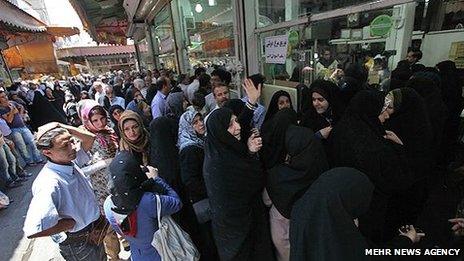Growing anger in Iran over cost of chicken as sanctions bite
- Published

"If the police come round to your house don't worry," says the latest wry joke doing the rounds in Tehran.
"It's not your satellite dish they're after. They just want to know if you have any chicken in your fridge."
In recent weeks the soaring price of chicken has become one of the hottest topics in Iran, even sparking unprecedented protests in one provincial town.
Several hundred people took to the streets in Neishabour, in the north-east, when anger at price rises and shortages finally boiled over.
Eyewitnesses told the BBC that the crowds in this usually very quiet and uneventful town were shouting anti-government slogans and demanding an end to price rises.
Chicken is one of the staples of Iranian cooking, and the main ingredient in one of the country's most popular dishes - zereshk polo ba morgh - chicken with rice and barberries.
It is also much cheaper than lamb or beef, making it a big favourite in a country where the economy is under pressure and ordinary shoppers are finding it increasingly difficult to make ends meet.
But in the past few months chicken prices have almost doubled to the equivalent of almost $5 (£3) per kilo at the official exchange rate, and many shops have been running short of supplies.
One key reason for this is that because of international banking sanctions, it is becoming very difficult for Iranian chicken producers to import feed from abroad, or to buy in extra supplies of frozen chicken when domestic stocks run low.
"We used to pay the seller by bank transfer into an international account," one Iranian importer told BBC Persian.
"But that's impossible now. Our only option is to send the money via a bureau de change. That's a big risk for us trade wise so we've stopped importing feed."
'Iranian spring'
The protests in Neishabour have sparked a huge debate on the Iranian blogosphere.
All the more so because the town has not seen any unrest in the past - even in 2009 when protests swept across the country after the disputed presidential election.
Observers have pointed to the fact that the revolutions in many Arab countries began with protests over price rises.
Could this be the start of an Iranian spring, they ask, as ordinary people from the provinces join the urban elite in calling for change?
"Last time the protests were about politics and I didn't take part," a caller from Shiraz told BBC Persian radio.
"But this time it's about food. If I can't feed my family then I will be much more likely to go out on the streets."
The Iranian authorities are certainly taking the situation very seriously.
On Tuesday MPs held a special closed door briefing on the impact of sanctions in various sectors of the economy.
This follows unusually frank warnings from a number of senior government officials and Revolutionary Guards commanders in recent months about the damage sanctions are doing and the possibility they could spark off social unrest.
In June, Tehran's chief of police Ahmadi Moghaddam advised local television channels not to upset hard-pressed consumers by showing people eating chicken.
This week a prominent cleric, Ayatollah Makarem Shirazi suggested that it was actually more healthy to eat vegetables rather than meat.
And even state television has been getting in on the act.
All week one of Iran's most popular TV chefs, Saman Golriz, has helpfully been showing people how to make vegetarian dishes on his hugely popular daily show.
Mr Golriz's efforts have prompted lots of wry comments on Iranian social media sites.
'No laughing matter'
For weeks now people have been sharing online jokes about the chicken crisis.
One popular cartoon shows a chicken fitted with security cameras and a sign saying "burglar alarm in operation".
Another shows some surprised looking airline pilots watching a chicken sail by their cockpit window, propelled into the stratosphere by soaring prices.
But it is clear from the phone calls the BBC Persian service has received over the past few days that for many Iranians the price of chicken is no laughing matter.
"I haven't been able to afford either chicken or meat for the past four months", said Ali from Ardabil.
"How can I expect my children to fast for Ramadan if I can't afford to feed them at the end of the day?"
"I've heard that they're giving subsidised chicken to civil servants," said a woman from Tehran, breaking down in tears as she spoke.
"I work for a private company so that won't help me. I just can't afford the full price."
Iranian economists say they expect the government's immediate focus will be to contain price rises and deal with shortages in key areas in order to prevent a repeat of the Neishabour protests.
An industry insider told BBC Persian that plans are already under way to start importing frozen chicken from Venezuela.
But with sanctions limiting their room for manoeuvre, the challenge for the government will be how to spend money to improve things in one area without sparking off more price rises - and more possible public discontent - elsewhere.
- Published23 July 2012
- Published30 March 2015
- Published6 September 2023